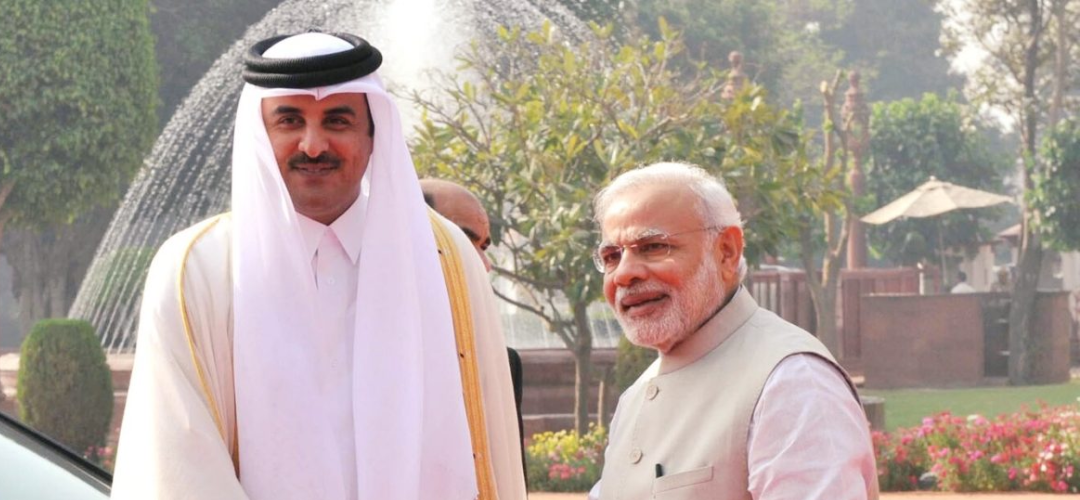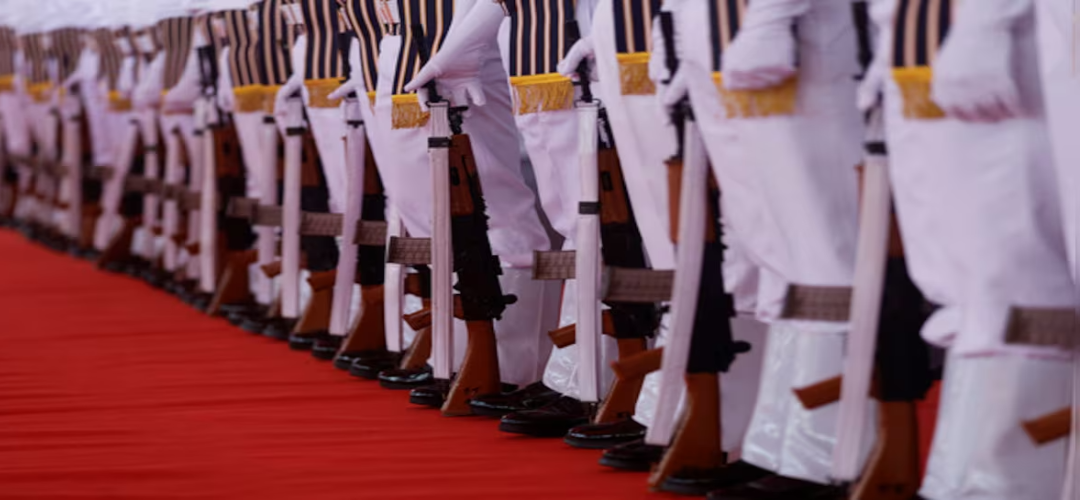India and Qatar: Gathering Momentum
February 24, 2024 | Expert Insights

The recent release of all eight Indian naval officers detained in Qatari waters, announced on the eve of Prime Minister Narendra Modi's visit to Doha, serves as a significant marker of the resilience and growing trust within the India-Qatar partnership. The initial sentencing of the officers to death for alleged espionage charges, although never officially confirmed by either nation, understandably raised concerns. However, the subsequent release of all officers is a testament to both sides' open communication and proactive diplomacy to reach an amicable solution.
Though potentially unsettling, this incident ultimately serves as a reminder of the established trust and understanding that defines the India-Qatar partnership.
Background
The relationship between India and Qatar extends beyond mere economic transactions, weaving a tapestry rich with historical and cultural connections. This is exemplified by the vibrant Indian community in Doha, exceeding 800,000 individuals. Their presence serves as a testament to the deep people-to-people ties between the two nations and contributes significantly to Qatar's development, acting as a bridge between cultures.
Beyond cultural linkages, the India-Qatar partnership is solidified by robust economic ties. Qatar stands as India's largest trading partner within the Gulf region, with bilateral trade exceeding a staggering $20 billion annually.
In the realm of energy cooperation, Qatar stands as India's largest source of liquefied natural gas (LNG), supplying over half of India's total LNG imports. A pivotal player in this collaboration is Petronet LNG, India's leading gas importer, which has a significant long-term contract with Qatar to import 8.5 million tonnes of LNG per annum (mtpa). India, aiming to increase its natural gas share in the energy mix from 6 per cent to 15 per cent by 2030, is set to augment LNG imports in the coming years.

Analysis
The Indian government's Middle East policy has been characterised by a steady hand in building economic connections without any geopolitical preconditions save those of peaceful business-oriented policy frameworks. This approach of geoeconomic primacy has become an Asian brand in the 21st century, and India has gained dividends from it.
Qatar is an important lynchpin in India's outreach to the Middle East. Despite its small size, Qatar punches far beyond its weight. It was the first Gulf country to host the prestigious FIFA World Cup and did so with precision and elan, despite Western naysayers who expected the whole event to be a damp squib. It successfully faced a boycott that lasted from 2017 to 2021, led by Saudi Arabia and supported by UAE, Bahrain and Egypt. The boycott represented an intricate mix of rivalries, ambitions, and contestations, as well as regional power games and personal animus between the leaders.
However, it is since the October 7th assault on Israel by Hamas that Qatar has emerged as the most influential country in the region. The fact that it is one of the very few countries with open channels of communication with both Israel and Hamas has made this tiny gas-rich nation the lead negotiator. If any progress has been made in releasing some hostages, the credit goes to Doha. However, this has elicited criticism in the West, where many view Qatar as pro-Hamas.
The American withdrawal from Afghanistan in August 2021 entailed Qatar being officially designated as the representative of American interests in Afghanistan. The Gulf country even partnered with Turkey to initiate talks for maintaining airports in Taliban-ruled Afghanistan.
India has been closely monitoring the growing Chinese footprint in Qatar. The 2022 China-Qatar gas deal is not just about energy security but also signifies the growing ties between the two regarding their converging geopolitical orientation and interests in Afghanistan, Iran and the larger regional security issues in West Asia. Qatar is Iran's maritime neighbour, and the two countries share the world's largest gas field; it serves China to nurture a favourable strategic partnership with both.
While the economic ties between India are well-documented, the true strength of their relationship lies in the convergence of strategic interests that extends far beyond mere trade. This convergence manifests in several key areas, offering immense potential for future collaboration and solidifying a partnership crucial for regional stability. Both nations collaborate on counter-terrorism initiatives, information sharing, and joint military exercises. Qatar's strategic location in the Gulf makes it a crucial partner for India's Indo-Pacific vision, while India's growing influence offers Qatar a valuable counterbalance in the region.
A key pillar of this collaboration is joint military exercises. The "Zair Al-Bahr" exercise, conducted annually between the Indian and Qatari navies, focuses on maritime security operations like anti-piracy drills, surface action exercises, and search and rescue operations. This fosters interoperability between their naval forces, enabling them to respond effectively to maritime threats in the region. Similarly, the "Al-Siddiqua" exercise involving their air forces hones their skills in joint air combat operations and aerial refuelling.
Sharing vital intelligence and information forms another crucial aspect of their collaboration. Both nations participate in the Multilateral Naval Exercise "AMAN," where information exchange on maritime security threats and best practices takes centre stage. Additionally, they share intelligence on terrorist networks, the movement of suspicious individuals, and emerging security challenges, empowering them to proactively counter potential threats. Additionally, Qatar has expressed interest in acquiring Indian-made defence equipment, signifying their trust in India's technological prowess. This two-way exchange of expertise and technology further strengthens their collective security posture.
Furthermore, Qatar's ambitious $200 billion programme to modernise its transportation, energy, and urban landscape presents lucrative opportunities for Indian companies renowned for their construction, engineering, and project management expertise. This collaboration promises economic growth, enhanced connectivity, and a brighter future for both nations.
Indian firms are already actively participating in key projects shaping Qatar's infrastructure landscape. Larsen & Toubro, a leading Indian engineering conglomerate, secured a contract to build the first phase of the Doha Metro, a state-of-the-art rapid transit system transforming urban mobility in the capital city. Similarly, GMR Infrastructure, another Indian giant, is involved in developing Hamad International Airport, a vital hub connecting Qatar to the world.
Looking beyond transportation, Indian companies are also contributing to Qatar's energy sector. Jindal Steel and Power, a major Indian steel producer, supplies steel pipes for the North Field Expansion project, a massive undertaking to increase Qatar's LNG production capacity. This collaboration strengthens both nations' energy security while fostering economic growth through trade and investment.
The partnership extends to smart city development, a key focus of Qatar's vision for the future. Indian firms are actively involved in projects like Msheireb Downtown Doha, a sustainable urban development aimed at becoming a global model for smart cities. This collaboration fosters knowledge sharing and technological advancements, paving the way for developing future-proof infrastructure that benefits both nations.
Economic ties and strategic convergence form the bedrock of the India-Qatar partnership, fostering a vibrant cultural exchange that strengthens people-to-people ties and lays the foundation for a more stable and prosperous future. In 2023, 250,000 Indian tourists visited Qatar, drawn by its cultural treasures, breathtaking landscapes, and world-class hospitality. This number is projected to reach 300,000 by 2025, indicating a growing desire among Indians to experience Qatari culture firsthand. Similarly, the number of Qatari tourists visiting India has surpassed 50,000. This surge in tourism not only boosts the economies of both nations but also fosters personal connections.
Assessment
- With the rebranded Wagner group now directly under the Russian government, it can no longer operate in the shroud of mystery that it did as a private military company. However, even while this may affect the way it functions, it is likely to continue in the same vein, even if it is more overt than before.
- Russia is likely to use the paramilitary group to pursue its renewed interest in the region, which has strengthened since its global isolation as it looks to regain political and economic influence and leverage over the West.
- With Western military influence in the region on the wane, one can visualise a greater outreach by Moscow in Africa.








Comments